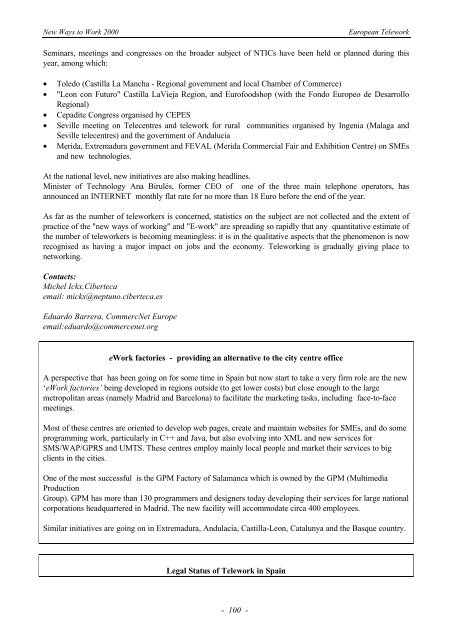eWORK 2000 - European Telework Week
eWORK 2000 - European Telework Week
eWORK 2000 - European Telework Week
- No tags were found...
Create successful ePaper yourself
Turn your PDF publications into a flip-book with our unique Google optimized e-Paper software.
New Ways to Work <strong>2000</strong><strong>European</strong> <strong>Telework</strong>Seminars, meetings and congresses on the broader subject of NTICs have been held or planned during thisyear, among which:• Toledo (Castilla La Mancha - Regional government and local Chamber of Commerce)• "Leon con Futuro" Castilla LaVieja Region, and Eurofoodshop (with the Fondo Europeo de DesarrolloRegional)• Cepadite Congress organised by CEPES• Seville meeting on Telecentres and telework for rural communities organised by Ingenia (Malaga andSeville telecentres) and the government of Andalucia• Merida, Extremadura government and FEVAL (Merida Commercial Fair and Exhibition Centre) on SMEsand new technologies.At the national level, new initiatives are also making headlines.Minister of Technology Ana Birulés, former CEO of one of the three main telephone operators, hasannounced an INTERNET monthly flat rate for no more than 18 Euro before the end of the year.As far as the number of teleworkers is concerned, statistics on the subject are not collected and the extent ofpractice of the "new ways of working" and "E-work" are spreading so rapidly that any quantitative estimate ofthe number of teleworkers is becoming meaningless: it is in the qualitative aspects that the phenomenon is nowrecognised as having a major impact on jobs and the economy. <strong>Telework</strong>ing is gradually giving place tonetworking.Contacts:Michel Ickx,Cibertecaemail: mickx@neptuno.ciberteca.esEduardo Barrera, CommercNet Europeemail:eduardo@commercenet.orgeWork factories - providing an alternative to the city centre officeA perspective that has been going on for some time in Spain but now start to take a very firm role are the new‘eWork factories’being developed in regions outside (to get lower costs) but close enough to the largemetropolitan areas (namely Madrid and Barcelona) to facilitate the marketing tasks, including face-to-facemeetings.Most of these centres are oriented to develop web pages, create and maintain websites for SMEs, and do someprogramming work, particularly in C++ and Java, but also evolving into XML and new services forSMS/WAP/GPRS and UMTS. These centres employ mainly local people and market their services to bigclients in the cities.One of the most successful is the GPM Factory of Salamanca which is owned by the GPM (MultimediaProductionGroup). GPM has more than 130 programmers and designers today developing their services for large nationalcorporations headquartered in Madrid. The new facility will accommodate circa 400 employees.Similar initiatives are going on in Extremadura, Andulacia, Castilla-Leon, Catalunya and the Basque country.Legal Status of <strong>Telework</strong> in Spain- 100 -








